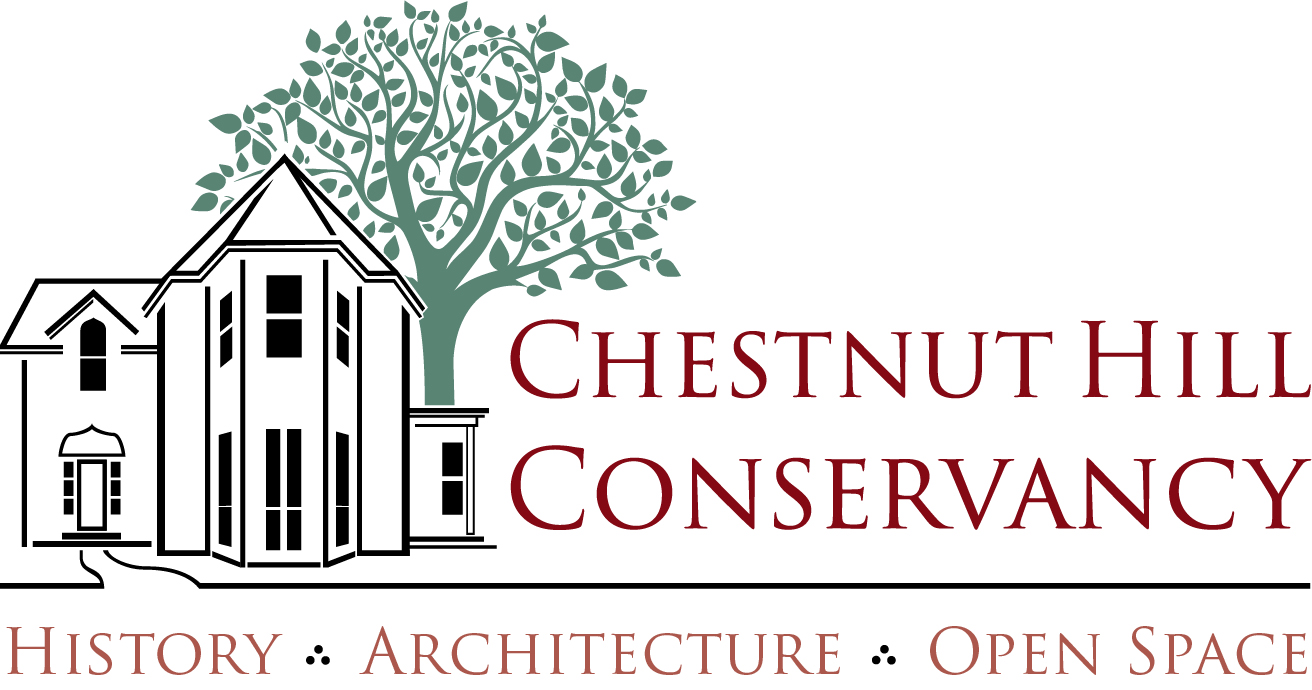
Louis Reid and her dog Timmy, 1942.
Chestnut Hill Conservancy Archives.
Thursday, March 4, 2024
By Tatiana Paden, Executive Office and Archives Coordinator
Andrew Jarvis contributed to this article.
Domestic work was among the few occupations available to Black women in the first part of the 20th century. And in Chestnut Hill, that was no different. Thanks to the work of Liz and Andrew Jarvis, we have the documented life story of one of those women, Louise Reid. On Sunday, January 10th, 1988, Andrew Jarvis sat with Louise and recorded her life story.
Louise Reid was born in Burkeville, VA, in 1906, the second youngest of five siblings. Her mother died when she was young, and so her father moved her and her siblings to live with their aunt and uncle in Powhatan, VA. She spent her childhood growing up on their farm and attended a small local schoolhouse for a few years until it was closed down. Her uncle and aunt were very humble and simple people. Her aunt, who was a freed slave, never got the chance to get an education and didn’t have any children of her own. Louise realized that her aunt did the best that she could for them.
Louise’s favorite thing when she was young was sewing. She taught herself to sew by hand. Cutting up anything she could get her hands on around the house. Her aunt was not too fond of it, as once she cut up her bonnet to make a dress for her doll. Her passion for clothes-making ignited after she got her first doll as a gift from her oldest sister.
“She wasn’t around much after our mother died…she used to come down and bring me nice little dresses and things, so she brought me a doll, a great big doll like that…and I was so proud of it. And I always liked dolls because I like to make clothes for them.” Once Louise was old enough to work, she left the farm and took the train to Richmond, working as the nanny for a doctor with three sons and one daughter. At 16, Louise moved to Flushing, New York. She started working for the Melcher family after the woman hosting her saw an ad in the paper. This job was the start of a lifelong change for Louise. “I stayed with Mrs. Blannon three years…but all my happy days were after I came to your grandmother,” Louise told Andrew. When she first started working for the Melchers, she only had experience in childcare, less so cooking. The Melchers paid for Louise to take cooking classes, which she used to her advantage. Bill and Clarissa Melcher had two daughters: Deborah “Debbie” and Sally. Louise scratched her sewing itch by creating clothes for the Melcher girl’s dolls. A full photographed catalog of her creations is available in the Conservancy’s Archives collection.
Over the years, Louise and the Melchers would move a couple of times. First to West Orange, NJ, and settled in Chestnut Hill by the 1930s. During the Great Depression, Bill Melcher lost his job at Baldwin Locomotive Works and struggled to support the family. Even through this hard time, Louise decided to stay. “I stayed on, yes…because I tell you I didn’t mind, I didn’t have anywhere special to go either, so I was glad they was willing to let me stay on, you know?” she continues, “It would have been so hard for me to go and get some new job because by that time I had got very well adjusted to the family. It would have been hard for me to go off and find somewhere else.” While unemployed, Bill found a way to pay her $5 weekly until he found a new job at the Smythe Paper Company.
Louise continued to work for the Melchers as the years went on. Debbie and Sally would go on to have children of their own. She would care for their grandchildren as she cared for their mothers whenever they visited their grandparents’ house.
By the 1960s, Louise started taking summer vacation bus trips through the Chestnut Hill Travel Agency. On one trip, she began to notice the racial discrimination she experienced when traveling. “It never occurred to me…I made my arrangements with the lady…and I did ask her…will any colored be in the group…at first I wasn’t scary or nothing, but I felt a little funny…of course, the people was real nice, but some of them was looking at me, you know, but I didn’t let it…I always try to be nice to people.” She was always the only Black person on each bus tour she went on, but she had no problem with that. She would send postcards to the family while she was away, sharing her experiences as she traveled from Tennessee to California and even Canada.
After 52 years of working for the Melcher family, Louise would move from their house in Chestnut Hill to her own home in Germantown. Louise attempted to reconnect with her family in Virginia a few times but decided to stay in Philadelphia. She lived a happy, humble life until she passed away in 1994. Her ashes were interred beside Bill and Clarissa Melcher’s at the Presbyterian Church of Chestnut Hill. “I hope I said something that amounts to something…my life wasn’t exactly a happy one when I was a little child, but I had to live through it anyhow…but I am very happy and like my apartment here. I’m very happy now.”

